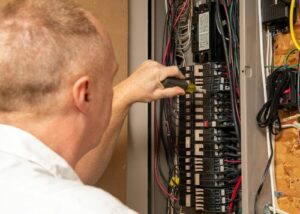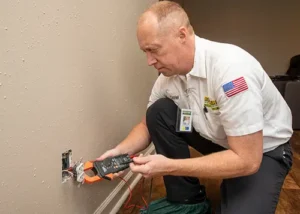How Power Surges Damage Appliances and Electronics
Power surges don’t announce themselves with fanfare. One moment everything is normal, and the next your TV screen flickers or your fridge makes a sound you’ve never heard before. That sudden jolt of extra electricity can quietly wreck your devices, sometimes in an instant, sometimes slowly over months. And the kicker? Most homeowners don’t think about it until their stuff stops working.
What Exactly Is a Power Surge?
Think of your home’s electrical system like water pipes. Power flows steadily, filling the “pipes” with the right amount of current. A power surge is like a sudden flood rushing through—too much at once.
Lightning strikes are the dramatic cause, but surges can also happen when large appliances cycle on and off or when there’s trouble on the utility’s end. When that excess energy finds its way into your wiring, it spreads through your house, and it can damage appliances that were never built to handle the overload.
How Surges Damage Appliances and Electronics
The effect depends on what gets hit. Sensitive electronics like computers, routers, or game consoles are at the greatest risk. Their tiny components fry under the pressure of unexpected spikes.
Larger appliances like refrigerators and washing machines can take a surge and limp along, but the damage isn’t gone. Motors overheat, insulation breaks down, and before you know it the appliance fails years earlier than it should have. I’ve seen homes where a single surge shortened the lifespan of nearly everything plugged in. That’s how sneaky it can be.
And let’s not forget smaller things—coffee makers, microwaves, even that fancy smart speaker. They’re not immune. One power surge can damage appliances across the board.
The Slow Burn vs. the Big Bang
Sometimes the damage is instant: the surge hits, your device pops, and it’s gone. Other times it’s a slow burn. Repeated smaller surges wear down internal parts. You don’t notice right away, but after six months the laptop won’t stay on, or the fridge can’t keep a steady temperature. It’s like bending a paperclip. The first few bends seem fine, but eventually, it snaps. Electrical systems work the same way.
Can You Prevent It?
You can’t stop power surges completely, but you can protect your home from the worst effects.
Here’s how:
- Whole Home Surge Protection . Installed at your electrical panel, this device acts like a shield, stopping most excess voltage before it gets inside.
- Point-of-use protectors. Those power strips with surge protection aren’t perfect, but they’re better than plugging directly into the wall.
- Regular inspections. Older wiring and overloaded circuits make it easier for surges to damage appliances. Having a licensed electrician check things out can save headaches later.
Why Electrical Safety Isn’t Just About Convenience
Yes, losing a TV or laptop is annoying and costly, but it’s more than that. Surges can create hot spots in wiring, leading to fire risks. If the surge damages connections inside a breaker panel or outlet, it doesn’t just hurt appliances—it endangers the whole house.
That’s why calling in help is smart. And it doesn’t have to be complicated. You call. We come. It’s fixed. That’s how we handle electrical work, plain and simple.
Real-World Example
A homeowner in Katy once told me they had no idea what caused their refrigerator to fail after only five years. When we checked, the outlet showed signs of surge damage. That one event probably shaved years off every major appliance in the house. It’s a story we hear over and over, people only realize after it’s too late.
FAQ
Do power surges only happen during storms?
No. While lightning is a big cause, most surges come from inside the home when large appliances cycle on and off.
Can a surge protector save everything?
Not always. Small plug-in protectors help, but a whole-home system is the best defense for long term protection.
How do I know if my appliances were damaged?
If you notice flickering, strange noises, or sudden failures after a surge, that’s a clue. But sometimes the damage shows up months later.
Are repairs possible after a surge?
Minor fixes, yes. But often it’s cheaper to replace the appliance. The better option is prevention before damage happens.
Don’t Wait Until After the Surge
Power surges are unpredictable, but the way they damage appliances is consistent and costly. From small electronics to big-ticket refrigerators, nothing is safe without protection.
Don’t gamble with your home. Call in electricians who know how to spot weak points, install protection, and keep your house safe. Fixed right the first time—that’s the promise we stand by. Protect today, relax tomorrow.

